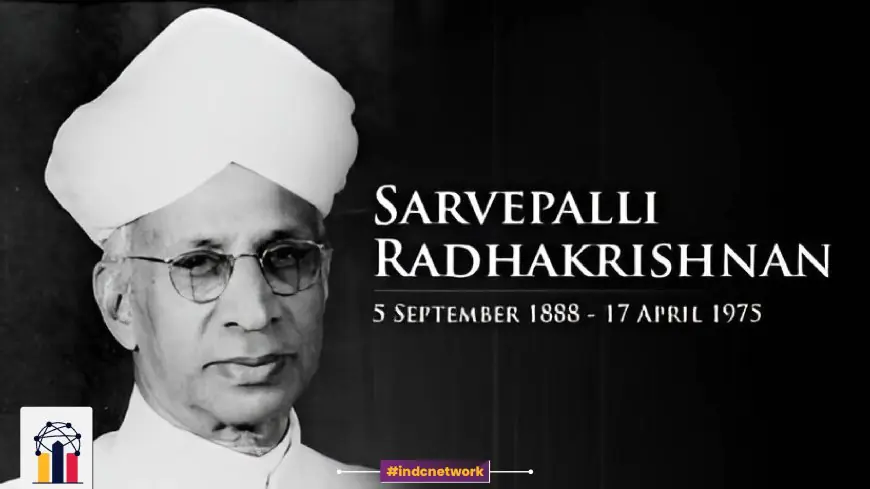The Life and Legacy of Dr. Sarvepalli Radhakrishnan: Philosopher, Statesman, and Social Reformer
Dr. Sarvepalli Radhakrishnan was an Indian philosopher, educator, and statesman who became the second President of India. His life journey is an inspiring tale of a brilliant academician who used his profound knowledge of philosophy to bridge the gap between the East and the West. A champion of education and ethics, Radhakrishnan also worked for social reforms, emphasizing moral values and human dignity. This article explores his early life, academic achievements, political career, contributions to social reform, and his enduring impact on Indian society and education.

INDC Network : Biography : The Life and Legacy of Dr. Sarvepalli Radhakrishnan: Philosopher, Statesman, and Social Reformer
Introduction :Dr. Sarvepalli Radhakrishnan, one of India’s most esteemed philosophers and statesmen, was not only a profound intellectual but also a dedicated social reformer. His philosophical insights, coupled with a deep understanding of India's rich cultural and religious traditions, made him a key figure in shaping modern India. Widely recognized for his scholarly contributions and revered as an educator, Radhakrishnan’s life was marked by a relentless pursuit of knowledge, service to the nation, and efforts to bridge the gap between Eastern and Western thought.
Though he is most remembered as the second President of India, Dr. Radhakrishnan's legacy extends far beyond his political role. His intellectual prowess, combined with a compassionate approach to education and social reform, left an indelible mark on the Indian education system and the country’s philosophical outlook. This article traces the life of Dr. Sarvepalli Radhakrishnan, delving into his early years, career as an educator, political life, and his enduring impact on both national and global thought.
Early Life and Education : Dr. Sarvepalli Radhakrishnan was born on September 5, 1888, in a small village called Tiruttani in Tamil Nadu, India. He was born into a Telugu Brahmin family, and his father, Sarvepalli Veeraswamy, worked as a subordinate revenue official under a zamindar. Though the family’s financial situation was modest, Radhakrishnan’s parents prioritized education, recognizing their son's intellectual potential from a young age.
Radhakrishnan's early education took place in Tiruttani and nearby Tirupati. Later, he attended Voorhees College in Vellore, but soon transferred to the prestigious Madras Christian College, where he excelled in his studies. It was here that Radhakrishnan's intellectual abilities truly began to flourish, particularly in the field of philosophy. He was deeply influenced by Western philosophical traditions, as well as India's own spiritual heritage, particularly the teachings of Vedanta.
His academic brilliance earned him a scholarship, and he completed his undergraduate degree with high distinction. Radhakrishnan went on to earn a master’s degree in philosophy, writing his thesis on "The Ethics of the Vedanta and its Metaphysical Presuppositions." This thesis was a bold attempt to present Vedanta as a comprehensive ethical and metaphysical system, showing that Indian philosophy was as rational and profound as Western thought.
Academic Career and Philosophical Contributions : Dr. Sarvepalli Radhakrishnan’s reputation as a philosopher began to grow rapidly during his early teaching career. His first academic appointment was at Madras Presidency College, where he taught philosophy. Soon after, he took up a teaching position at the University of Mysore, where his profound understanding of both Eastern and Western philosophy began to attract attention.
His magnum opus, Indian Philosophy (1923), established him as a preeminent scholar in the field and brought Indian philosophical thought to the forefront of global intellectual discourse. In this work, Radhakrishnan systematically examined India’s ancient philosophical traditions, especially Vedanta, and presented them to Western readers as a robust intellectual system on par with Western philosophical traditions. His analysis not only defended India’s intellectual heritage but also sought to build bridges between the philosophical traditions of the East and West.
Dr. Radhakrishnan was invited to Oxford University in 1936, where he was appointed to the prestigious Spalding Professorship of Eastern Religions and Ethics, a position he held for over a decade. During this time, he also served as a visiting professor at Harvard University, delivering lectures that furthered global understanding of Indian philosophy. His work during this period emphasized the universality of spiritual values and the importance of cross-cultural understanding in philosophy.
One of Radhakrishnan’s significant contributions to philosophy was his interpretation of Advaita Vedanta, a school of Indian philosophy that emphasizes non-dualism and the unity of all existence. He sought to demonstrate how Vedanta’s metaphysical principles could contribute to the resolution of contemporary ethical, religious, and social issues. Radhakrishnan’s philosophy was not limited to academic debates; he saw philosophy as a way to solve real-world problems, particularly the challenges of colonialism, cultural conflict, and the need for social reform.
Advocate for Education and Teacher's Day : Beyond his achievements in philosophy, Dr. Radhakrishnan was a passionate advocate for education. He believed that education was the most powerful tool for transforming society and fostering human dignity. His dedication to the cause of education was rooted in the belief that it should aim not just at imparting knowledge but also at developing moral character and nurturing wisdom.
When Dr. Radhakrishnan became the President of India, his former students approached him with the idea of celebrating his birthday, September 5th, as a tribute to his contributions as a teacher. In response, he famously remarked, “Instead of celebrating my birthday, it would be my proud privilege if September 5th is observed as Teachers' Day.” Since then, Teacher’s Day in India has been celebrated on September 5th every year, in honor of Dr. Radhakrishnan’s legacy as an educator and mentor.
For Dr. Radhakrishnan, teaching was a noble profession. He believed that teachers played a crucial role in shaping the minds of future generations and that the role of a teacher went beyond the classroom, extending to the moral and ethical guidance of students. His respect for the teaching profession and his understanding of its vital role in nation-building continue to inspire educators in India and around the world.
Political Career and Statesmanship : While Dr. Radhakrishnan was primarily known as a philosopher and educator, his intellectual stature and moral authority led him to play a significant role in India’s political life, particularly during and after the struggle for independence. His deep understanding of both Indian culture and Western philosophy made him an ideal representative for India on the global stage.
In 1947, following India’s independence from British rule, Dr. Radhakrishnan was appointed as the country’s first Vice President, serving under President Dr. Rajendra Prasad. His role as Vice President was marked by his diplomatic acumen and his ability to mediate between political factions during a turbulent period in India’s early years as a republic.
In 1962, Dr. Sarvepalli Radhakrishnan was elected as the second President of India, succeeding Dr. Rajendra Prasad. His presidency coincided with a critical time in Indian history, as the country was navigating its post-colonial identity and striving to balance modernization with tradition. Dr. Radhakrishnan’s presidency was characterized by his emphasis on moral leadership and ethical governance. He was widely respected for his integrity, humility, and dedication to the principles of democracy.
During his presidency, Radhakrishnan continued to emphasize the importance of education, culture, and spiritual values in nation-building. He maintained that India’s progress depended not only on economic and political development but also on the moral and ethical development of its citizens.
Social Reform and Human Dignity : While Dr. Sarvepalli Radhakrishnan’s contributions to education and philosophy are widely celebrated, his role as a social reformer is equally important. His philosophical outlook was deeply intertwined with his commitment to social justice, and he consistently advocated for the rights of marginalized communities and the upliftment of the underprivileged.
Radhakrishnan was a strong advocate for the dignity of the individual, regardless of caste, creed, or social background. His interpretation of Vedanta emphasized the unity of all human beings and the intrinsic worth of every individual, which resonated with the principles of social equality. He believed that true progress could only be achieved when society embraced the values of compassion, tolerance, and mutual respect.
During his tenure as President, Radhakrishnan supported several initiatives aimed at reducing poverty, improving access to education, and promoting social welfare. He understood that India’s development depended on uplifting the poor and providing opportunities for all citizens to realize their potential. While his presidency was largely symbolic in nature, his moral authority lent weight to the causes he championed, particularly in the areas of education and social reform.
Radhakrishnan’s philosophy also extended to interfaith dialogue and religious harmony. As a scholar of comparative religion, he was a firm believer in the idea that different religious traditions could coexist peacefully and that mutual understanding between different faiths was essential for a harmonious society. He worked tirelessly to promote tolerance and understanding between Hindus, Muslims, Christians, and other religious groups in India.
Legacy and Influence : Dr. Sarvepalli Radhakrishnan’s life and legacy continue to inspire generations of scholars, educators, and leaders in India and around the world. His contributions to philosophy, particularly his work on Vedanta and his efforts to bridge Eastern and Western thought, have had a lasting impact on global intellectual discourse.
In India, his role as a champion of education is celebrated every year on Teacher’s Day, a fitting tribute to a man who believed in the transformative power of education. His ideas on moral leadership, ethical governance, and the dignity of the individual continue to resonate with those who seek to build a more just and equitable society.
Radhakrishnan’s legacy as a philosopher, educator, and statesman remains an enduring source of inspiration. His belief in the unity of humanity, the importance of moral values, and the power of education to shape the future will continue to guide India and the world for generations to come.
What's Your Reaction?













































































































































































